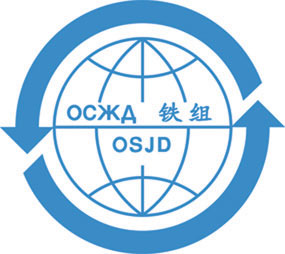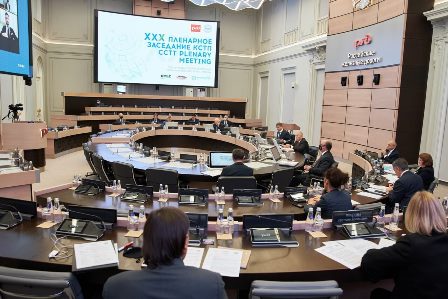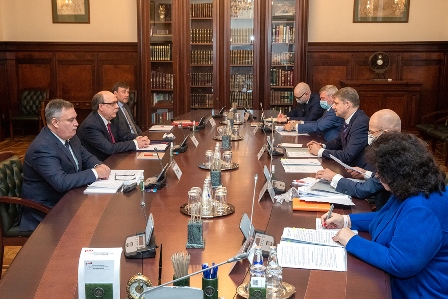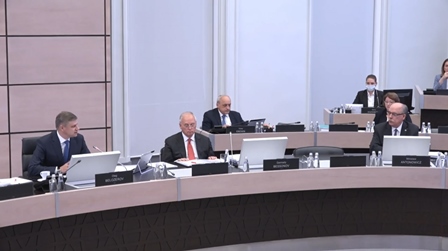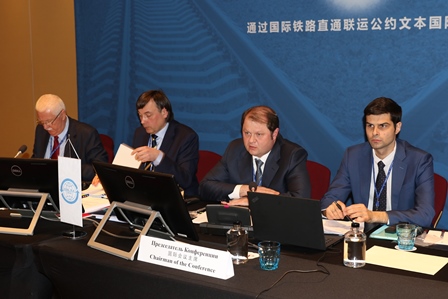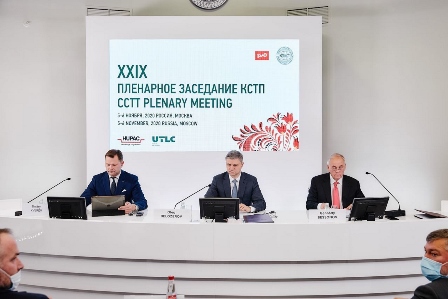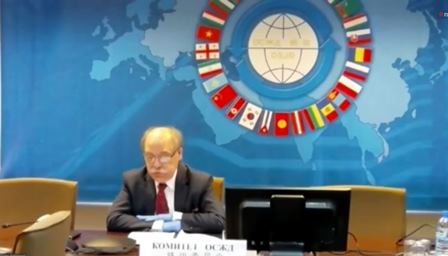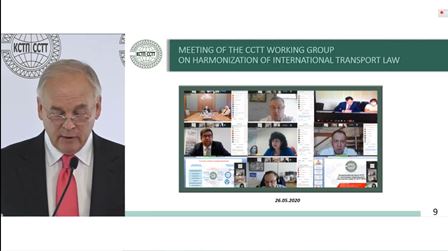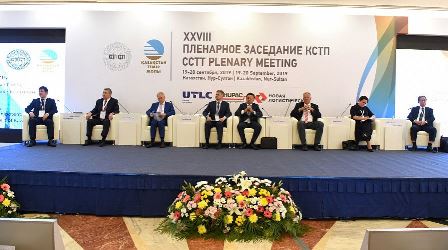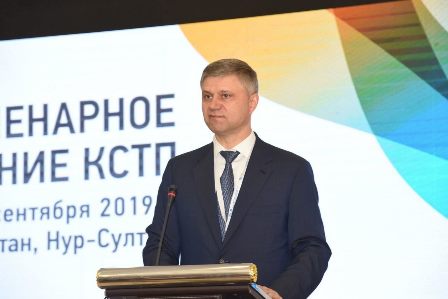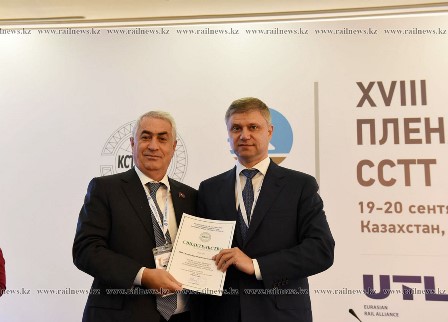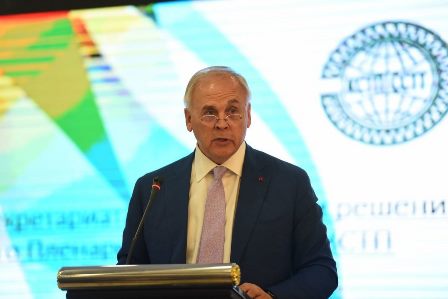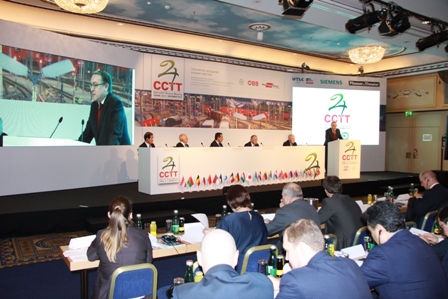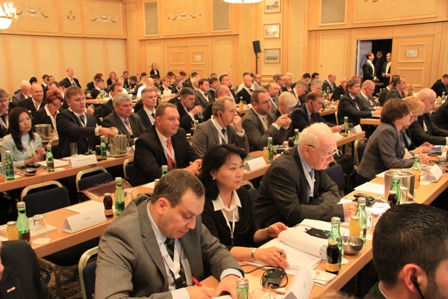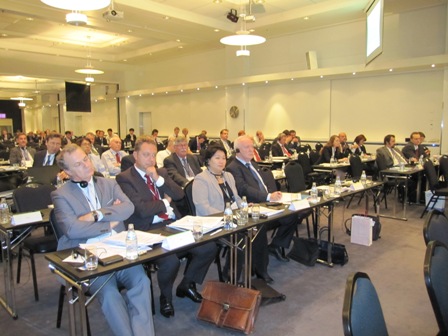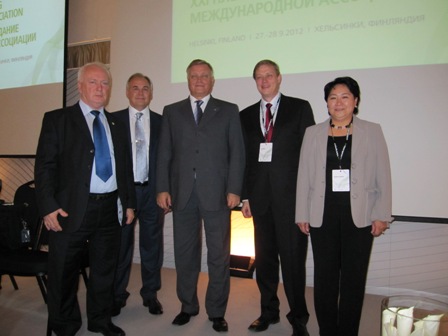Cooperation with CCTT
XXXII CCTT Plenary Meeting
On 17 October 2023, the XXXII CCTT Plenary Meeting of the International Coordinating Council on Trans-Eurasian Transportation (CCTT), dedicated this year to the 30th anniversary of CCTT, was held in Moscow. More than 250 delegates from various agencies, companies and organisations from 20 countries of Europe and Asia, heads and representatives of international associations and organisations, including the OSJD Committee, took part in its work.
Opening the meeting, CCTT Chairman, General Director – Chairman of the Board of the RZD OJSC Oleg Belozyerov, in particular, noted: “Structural changes in railway transport, restructuring of transport and logistics chains, development of multimodality, building new interindustry and international alliances have radically expanded the composition of the Council’s participants. The principle of the CCTT “cooperation and collaboration for a common result” has repeatedly shown its effectiveness and no alternative at many stages of the development of Euro-Asian transport links. I welcome our new members and guests from China, South Korea, Iran, India, and Southeast Asian countries, who, I am sure, will appreciate our effective platform for business and industry dialogue.” The Minister of Railways of the Russian Federation (1992−1996, 2002−2003), President of the RZD OJSC (2003-2005), Chairman and Secretary General of the Coordinating Council for Trans-Siberian Transportation (1996-2005), Advisor to the General Director of the RZD OJSC Gennady Fadeev addressed the participants of the Plenary meeting of the Coordinating Council with a welcoming address. Welcoming speeches were also delivered by Executive Secretary of the Economic and Social Commission for Asia and the Pacific (UNESCAP) Armida Salsia Alishakhbana, Deputy Secretary General of the CIS Ilkhom Nematov, Member of the Board (Minister) for Energy and Infrastructure of the Eurasian Economic Commission Arzybek Kozhoshev, Chairman of the OSJD Committee Mirosław Antonowicz.
In his welcoming address, Chairman of the OSJD Committee, Mirosław Antonowicz, congratulated the CCTT on its 30th anniversary, noting its great contribution to the development of transEurasian transport and cooperation with the OSJD.
For their great contribution to the development of cooperation with OSJD, the management of the CCTT was awarded honorary OSJD diplomas.
In his report “The role and objectives of CCTT in the formation of a sustainable logistics system in the Eurasian space: new approaches and effective solutions”, CCTT Chairman, Oleg Belozyerov, highly appreciating the activities of the CCTT during the reporting period, summed up the development progress of trans-Eurasian transport for 2022-2023 and outlined the goals and tasks of the Coordinating Council for the future.
Among them: assistance in building a network of mutually complementary Euro-Asian routes, priority attention to multimodality issues, including the CCTT “Multimodal Transport Network” project, which is being transferred to digital mode starting this year, expanding the range of cross-sectoral issues, including in relation to the issues of transportation of agricultural goods and perishable products, expanding partnerships with key participants in the digitalisation process in transport, issues of human capital development in the railway industry, and the green agenda. He also nominated the new CCTT Secretary General – Mr. Mikhail Goncharov who is to assume this post starting from 1 June 2024.
CCTT General Secretary, Gennady Bessonov, presented the CCTT activity report for the period starting from November 2022 till October 2023. Along with the activities of the regular working groups of the Council, partnerships with international organisations, including OSJD, associations and unions were expanded (including 4 memoranda of cooperation signed), business missions were conducted to China, Kazakhstan and Iran, conferences were organised jointly with partners on various aspects of cross-border transportation. CCTT actively participated in the works of international organisations of railway industry, including the organisations of the UN system, OSJD and a number of regional international formats. Together with the CIS Coordinating Transport Council (CTC) and the Association “Business Centre for Economic Development of the CIS”, the CIS Transport Business Dialogue was launched. In continuation of the direction of agrologistics, joint work with ASORPS has been launched on the issues of transportation of perishable food products, which is the contribution of CCTT to the “Agenda 2030”. Among other activities contributing to the achievement of the Sustainable Development Goals are those within the framework of CCTT to develop the human resources potential of the railway transport industry, promote the reduction of emissions by transport into the atmosphere, as well as the promotion of advanced environmentally friendly services at industry’s and regional events.
During the meeting, the following new members were admitted to the CCTT:
- China International Freight Forwarders Association (CIFA);
- Federation of Freight Forwarding Associations in India (FFFAI);
- LX PANTOS (Republic of Korea);
- ISACO Group (China);
- Weisa International Freight Forwarding Co.Ltd. (China);
- Tie Tie Logistics Co. Ltd. (China).
Thus, taking into account these changes, 79 entities from 19 countries are members of the CCTT at present.
In accordance with the Charter of the CCTT, CIFA Secretary General Li Zhiming and FFFAI Chairman Shankar Shinde were elected as new CCTT Vice-Chairmen.
In order to promote the development of international transport links, the following documents have been signed:
- Memorandum of Cooperation between the CCTT Secretariat and the Secretariat of the Business Council of the Shanghai Cooperation Organisation;
- Memorandum of Cooperation with the Association of European Businesses (AEB).
When discussing the agenda items, the participants of the Plenary Session presented their priori- ties, ongoing projects, and shared their visions for the development of cross-border transport on the European and Asian continents.
Deputy Minister of Transport of the Russian Federation, Valentin Ivanov, in his speech outlined the priorities for the development of the country’s transport complex. Among the most important priorities is the development of transportation along the West-East and North-South corridors, as well as along multimodal routes passing through the seaports of the Azov-Black Sea basin. He also drew attention to new routes connecting Russia and China through the Zabaikalsk and Nizhneleninskoye border checkpoints, activities to develop the western and trans-Caspian branches of the North-South ITC, as well as the implementation of projects using electronic navigation seals.
Deputy Minister of Roads and Urban Development, Chairman of the Board – Director General of the Railways of the Islamic Republic of Iran Seyed Miyad Salekhi spoke about the measures necessary to implement the transit potential of Iran, including planned projects for the construction of the Rasht-Astara railway line, the railway connection between Iran and Türkiye, as well as with access to Nakhichevan (Republic of Azerbaijan).
Welcoming new routes and transport services being introduced thanks to the use of the North-South ITC infrastructure, he focused on the importance of attracting freight flows onto the Iran’s railway lines.
FFFAI Chairman Shankar Shinde spoke about priority Indian transport and logistics projects, focusing on the importance of coordinated practical measures for the development of the North-South international transport corridor. CIFA Secretary General Li Zhiming, emphasising the importance of international cooperation for the development of cross-border container services, spoke about the measures to expand the geographical coverage of potential service users and the importance for these purposes of activities for the development of border crossing points, the introduction of cross-border technologies and IT solutions.
General Director, Chairman of the Board of UTLC- ERA JSC (OSJD affiliated enterprise) Alexey Grom, speaking about the company’s experience in organising the container services on the China- Europe-China route, proposed declaring the year of 2024 within the framework of CCTT the “Eurasian Year of Integration of Transport Corridors”.
At the same time, he drew attention to the ongoing processes in Eurasia to combine the development strategy of the EAEU and the Belt-and-Road Initiative, which have a significant impact on the development of the supply chains.
Fedor Kormilitsyn, Economic Affairs Officer at the Transport Connectivity and Logistics Section of the UN ESCAP Transport Division, spoke about the development of multilateral transport projects in the field of railway transport and logistics, digitalization of services in the field of international railway transport in the Asia-Pacific region.
The presentation by Chairman of the OSJD Committee Mirosław Antonowicz and Editor-in-Chief of the OSJD Bulletin Sergey Kabenkov was dedicated to practical activities in the development of Euro-Asian transport links, promoting the digitalization of the international transport process and border crossing procedures, including those using a unified CIM/SMGS consignment note, creation of an electronic “Single Window” system, introduction of paperless transportation technology, etc.
Deputy General Director of the China Railway Container Transportation Corporation (CRCT), Zhong Chen, having expressed his warm congratulations to CCTT on its 30th anniversary, spoke about the Corporation’s achievements in the development of Euro-Asian container railway transport between Europe and Asia. At the same time, he focused on the development of information systems that make it possible to provide users with the most complete information about the services rendered.
The presentation of the PJSC Far Eastern Shipping Company (FESCO, an OSJD affiliated enterprise) was devoted to the new logistics solutions in the field of inter- modal transport in the Euro- Asian traffic using new land and sea transport corridors.
President of the ASEAN Federation of Freight Forwarding Associations (AFFA), Alvin Chua Seng Wah, during his speech, noted that cooperation with CCTT will create a platform for dialogue in the transport and logistics sector and help strengthen transport connectivity with ASEAN countries and the Asia- Pacific region as a whole.
Other participants dwelt in their presentations and speeches on various aspects of freight traffic, including ensuring the safety of goods transportation in international traffic, the delivery of perish- able food products in the context of solving the problem of building a continuous chain of refrigerated goods delivery, the growth of transportation volumes along the routes passing through the countries of Central Asia, new logistics solutions for transport companies and many others.
The meeting participants were also provided with the information about the projects and activities of the CCTT working groups in such areas as digital transformation and the introduction of information technologies, cargo security and electronic seals, ecology and technospheric safety, and the environmental strategy of the CCTT.
For their great contribution to the development of trans-Eurasian links, the CCTT “Eurasian Transportation Excellence” Prize was awarded to a number of members and experts of CCTT, as well as the OSJD Committee. In honour of the CCTT 30th anniversary and for her great contribution to the development of cooperation between OSJD and CCTT, Chairperson of the OSJD Commission for Freight Traffic, Ms. Zubaida Aspayeva, was awarded an honorary CCTT diploma.
The following new members of the Coordinating Council presented their experience and ongoing projects in the transport and logistics sector: LX PANTOS, ISACO Group, Weisa International Freight Forwarding Co. Ltd. and Tie Tie Logistics Co. Ltd.
The representatives of the high schools – the Russian University of Transport (RUT (MIIT)), an OSJD affiliated enterprise) and the St. Petersburg State Economic University have demonstrated their readiness, as educational institutions, to cooperate in the field of personnel training for the transport and logistics industry – specialists with the necessary set of knowledge and skills necessary for work in modern conditions. Joint conferences in the CCTT/RUT (MIIT)/Association of Transport Universities format were highly appreciated, allowing to combine the efforts of science, education and industry companies in developing the human resources potential of the transport and logistics industries.
The CCTT plenary meeting confirmed the continuation of regular works within the frame-work of the activities of the working groups of the Coordinating Council, as well as on the projects presented by the CCTT Secretariat: “Multimodal transport network of Trans-Eurasian routes”, “Electronic train”, “Security & Electronic seals”, “Refrigerator Chain”.
Joint EAEC/CCTT Round Table on the subject “Status and prospects of cross-border transportation”
(press-release)
On 10 November 2022, a Round Table on the subject “Status and prospects of cross-border transportation” was held in Moscow in a hybrid format, which was jointly organised by the Eurasian Economic Commission (EAEC) and the International Coordinating Council for Trans- Eurasian Transportation (CCTT).
The heads of the EAEC and the CCTT, representatives of ministries and various state agencies (customs, border services), railway administrations, transport and logistics companies, unions and associations, development institutions and the academic community of the EAEU Member States took part in the work of the Round Table. The discussion was held in the EAEU Plus format: in addition to the representatives of the Republic of Armenia, Republic of Belarus, Republic of Kazakhstan, Kyrgyz Republic and Russian Federation, the representatives of the Republic of Uzbekistan, as well as international organisations, associations and financial institutions took part in the event: the OSJD Committee, CCTT, TMTM (TITR), Eurasian Development Bank (EDB) and heads of transport and logistics companies of the People’s Republic of China.
The participants were addressed with welcoming speeches by Member of the Board (Minister) in charge of Energy and Infrastructure of the EAEC Arzybek Kozhoshev, Member of the Board (Minister) in charge of Economics and Financial Policy of the EAEC Bykytzhan Sagintayev, Member of the Board (Minister) in charge of Integration and Macroeconomics of the EAEC Sergey Glazyev, Member of the Board (Minister) in charge of internal markets, digitalisation, information and communication technologies of the EAEC Varos Simonyan and CCTT Secretary General Gennady Bessonov. This event is a logical continuation of a completely new format for organising international meetings in the form of an “Open Dialogue”, during which the Round Table participants discuss the most important current problems of the transport industry.
Particular emphasis was placed by the participants on the discussion of those issues dealing with the process of creating conditions for the development of cross-border transportation, the introduction of advanced digital technologies for organising the transportation process, improving safety, security and environmental friendliness.
During the work of the Round Table, its participants exchanged experience and views on the prospects for the development of Trans-Eurasian transport links, taking into account modern trends in the development of freight traffic using various modes of transport.
The moderators of the event were Gennady Bessonov, CCTT Secretary General, and Elena Sherysheva, Deputy Director of the EAEC Transport and Infrastructure Department.
The presentations and reports of the speakers were contributed within the framework of four sessions.
Session 1. “Main directions in the development of integration processes in the context of building up the new logistics links for the delivery of goods”
Presentations during this session were made by:
- First Deputy Minister of Transport and Communications of the Kyrgyz Republic Nurlanbek Kaiynbaev;
- Deputy Head of the Federal Customs Service (FCS of Russia) Vladimir Ivin on the subject “Simplification of customs administration, and, in general, state control, as a factor in the successful development of new logistics links for the delivery of goods”;
- Director of the Department of Transport and Infrastructure of the EAEC Dauren Sabitov on the subject “Transport complex of the EAEU – integration trends”;
- Director of the EAEC Trade Policy Department Vladimir Serpikov on the subject “Development of transport corridors as a factor in the intensification of EAEU foreign trade”;
- Director of the Directorate of Digital Initiatives of the Eurasian Development Bank (EADB) Sevak Sarukhanyan on the subject “Actual issues of scaling digital solutions in the field of logistics”;
- Director of the Department of International Cooperation of the Ministry of Transport of the Russian Federation Alexei Sapetko on the subject “Development of international transport corridors in the Eurasian space”.
Session 2. Prospects for the development of transport corridors and their role in meeting the needs of the EAEU economy in transport and logistics services. Transport and customs aspects”
Speakers and subjects of the reports: were as follows:
- Head of the Department for Foreign Projects and International Cooperation of the RZD OJSC Anton Kozlov – “Transport corridors: current state and development prospects”;
- Director of the Department for Interaction with International Organisations of the “KTZ NC” JSC Aliya Akhmetova – “‘Kazakhstan Temir Zholy NC’ JSC in the system of global transport communications”;
- Representative of the “Directorate of Inter- national Transport Corridors” Autonomous Non-profit Organisation (DITC ANO), Advisor for International Cooperation Yuri Petrov – “Prospects for the development of transport corridors and transport and logistics services, further improvement of border crossing procedures and increase in cross-border traffic”.
Session 3. “Logistics supply chains of Eurasian goods: best practices. Prospects for the development of the EAEU transit potential”
In this session, presentations on various subjects were made by:
- Chairperson of the OSJD Commission on Freight Traffic Zubayda Aspayeva – “Organisation of international railway freight traffic. Legal aspects”;
- General Director, Chairman of the Board of UTLC ERA JSC Alexey Grom – “Integration of technologies, competencies and infrastructure capabilities as a key factor in the development of the international transport corridors”;
- Director, First Vice-President of TransContainer PJSC Viktor Markov – “New transit opportunities in the EAEU space”;
- General Director of the BAMAP Association Alexander Karpuk – “Development of multimodal container transportation as a key factor in overcoming infrastructure problems in the face of sanction pressure”;
- Head of the Main Department for Development and Sales of the Republican Unitary Enterprise “Beltamozhservice” Vadim Vazyuro – “Status and prospects of cross-border transportation”;
- Head of the Project Office of RZD Logistics JSC, General Director of Autonomous Nonprofit Organisation “Eurasian Agrologistics” (Directorate of the Eurasian Integration Project of the EAEU Eurasian Agroexpress) Alevtina Kirillova – “Providing accelerated logistics of agroindustrial products and food on the routes of transport corridors of the EAEU and partner countries”;
- Managing Director of “Beijing Trans Eurasia International” Wangxu Dong – “How to increase the efficiency of Eurasian railway transport – through the eyes of clients”;
- Deputy General Director for Foreign Economic Cooperation of “Xuan Yuan” Company Jiao Jian – “Cross-border movement of goods across the Amur river by means of a conveyor belt”.
Session 4. Prospects for the development of cross-border transportation in the EAEU
Speakers and subjects of the reports and presentations were as follows:
- Deputy Director of the Federal State Budgetary Institution “Scientific Center for Complex Transport Problems of the Ministry of Transport of the Russian Federation” Kirill Tyulenev – “Integration of supply chains in the system of transport corridors within the framework of the EAEU”;
- Deputy Director of the Institute, Head of the Arctic, Transport, Green Financing of the Autonomous Non-Commercial Organisation “Institute for Research and Expertise of Vnesheconombank” Yulia Zvorykina – “New transport and logistics technologies to expand the transport potential of the EAEU”;
- President of the Transport Systems Development Institute LLC (IRTS LLC) Alexander Sinev – “Improving the regulatory policy in the field of railway transport in the new economic conditions”;
- General Director, Center for Strategic Developments in Transport (CSDT) Anton Koren – “Strategic Directions for Increasing the Sustainability of the EAEU Transport Complex in Current Geopolitical and Economic Conditions”;
- representatives of the Federal State Autonomous Educational Institution of Higher Education “Russian University of Transport” (RUT (MIIT), OSJD affiliated enterprise) Anna Sinitsyna and Alexei Nekrasov – “Creation of sustainable supply chains in the conditions of uncertainty”.
As a result of the exchange of views, new approaches were developed to implement a joint strategy for responding to modern global challenges facing the transport system. At the same time, the effective solution of issues of cross- border transportation, which are beyond the competence of transport agencies, provides for the establishment of a practically oriented dialogue with the involvement of representatives of state control bodies with specialised experience and requirements in the field of reducing border crossing time, as well as participants in the transportation process.
It was noted that in the context of variable demand for the services of transport companies, the most important task is the rational use of infrastructure capabilities and the creation of additional mechanisms to stimulate and attract promising freight flows.
In the speeches and during the discussion, the importance of a systematic approach was once again emphasised to solve a global problem – to build up an effective system for organising the delivery of goods, taking into account modern economic conditions.
The participants in the Round Table noted with satisfaction that this event and the issues addressed during the discussion rightfully give an additional impetus to the ongoing work and open up a new vision on the problems of transport market participants, ways and methods of solving them.
The participants in the Round Table expressed a unanimous opinion on the need to hold such events on a regular basis with the involvement of an increasing number of partners.
Based on the results of work of the Round Table and discussions, a joint statement was adopted, which reflects the most daring ideas and proposals expressed in the speeches and during the discussion. The conclusions and recommendations of this document will be used by the Eurasian Economic Commission (EAEC) together with partners to solve the main task – the removal of existing restrictions on transportation by all modes of transport within the EAEU.
OSJD: a new impulse to international collaboration
(press release)
At the invitation of the CCTT Secretariat, Mr. Mirosław Antonowicz, Chairman of the OSJD Committee, attended the 30th Anniversary Plenary Meeting of the CCTT held in Moscow, the capital of the Russian Federation on 15-16 September 2021. As part of his participation in the plenary meeting, Mr. Antonowicz had working meetings with Mr. Vladimir Tokarev, Deputy Minister of Transport of the Russian Federation, and the top management of the Russian Railways OJSC, including Mr. Oleg Belozyorov, General Director and Chairman of the Management Board of RZD OJSC.
Working meeting at the RZD OJSC
During the 14 September 2021 meeting with the RZD OJSC delegation headed by Mr. Oleg Belozyorov, General Director and Chairman of the Management Board, the parties discussed various aspects of transcontinental railway transport operations and their further development.
It was noted that currently the OSJD serves as the platform for the development of 13 railway transport corridors, including the longest and most significant one, Corridor No. 1, that crosses the territory of Russia and includes the Trans-Siberian Railway, as well as the North- South corridors. Mr. Belozyorov pointed out that the development of international transport corridors was an unquestionable priority for the company. The corridors afforded the maximum efficiency of container transportation at a small fraction of the carbon footprint generated by the other modes of transport. He also noted that further development of international transport corridors was contingent on concerted efforts of market regulators, carriers, cargo owners, and forwarders in such areas as setting the tariff rates, facilitating border crossing procedures, and introduction of digital instruments.
Mirosław Antonowicz and Oleg Belozyorov shared their opinion that it was impossible to resolve all issues involved in the organisation of international freight transport operations within the competencies and powers of individual companies, and therefore it was important to set up coordinating bodies with mandates to manage OSJD railway transport corridors.
During the meeting, the significance was emphasised of the OSJD work to update or supplement with new additions the existing legal and regulatory framework that governs the organisation and administration of international freight and passenger carriage by rail. Under the auspices of the OSJD, a draft Agreement on and Rules of international transportation of containers by container trains had been prepared and agreed that sets a uniform procedure for the relations between railway carriers and container train operators.
The signing of this agreement would lay a foundation for further improvement of the legal and regulatory framework of container transportation.
Another issue addressed at the meeting was the digitisation of the process of transportation. The parties reconfirmed their interest and need to continue, within the OSJD, their joint efforts to expand the use of paperless technologies and electronic document processing in railway transport operations between Europe and Asia.
30th Plenary Meeting of the CCTT
The 30th Anniversary Plenary Meeting of the International Coordinating Council on Trans-Eurasian Transportation (CCTT), chaired by Mr. Oleg Belozyorov, General Director and Chairman of the Management Board of RZD OJSC, was held in Moscow, Russia, on 15-16 September 2021.
This year, the CCTT Secretariat initiated a new format for discussions, the Open Dialog, that allowed the participants to share their views of the prospective development of trans-Eurasian routes, and the role of the CCTT in the organisation of “green”, reliable, and safe multimodal corridors.
In his address, Mr. Oleg Belozyorov pointed out that the concerted joint action of the participants in the transportation process at the CCTT platform result in solutions that improve the competitive positions of rail transport on the international transport services market.
Among the challenges the CCTT was facing, Oleg Belozyorov put a special point on the need for continued digital transformation of transport processes and new logistics products demanded by the market. Making rail transport even more environment-friendly, and improving competencies related to training in the areas of international transport operations and logistics should also stand high on the industry’s agenda.
The Open Dialogue was also attended by managers and authorised representatives of railway undertakings from Austria, Azerbaijan, Belarus, Germany, Italy, Kazakhstan, China, the Republic of Korea, Latvia, Mongolia, Poland, Russia, and Finland, as well as by officials from the Federal Customs Service of Russia, Delo Group, Ural Mining and Metallurgical Company (UMMC) JSC, UTLC ERA JSC (an OSJD affiliated enterprise), and FESCO Group, who told the meeting about their organisations’ achievements and challenges.
In his intervention, Mr. Mirosław Antonowicz, Chairman of the OSJD Committee, highlighted the fact that in 2021 the OSJD marked 65 years from its foundation, with the SMGS and SMPS agreements seeing their 70th anniversaries. The OSJD Committee as the executive body of the organisation served as the depositary of both agreements. In addition, 2021 was a special year for rail transport in Europe since it had been declared the European Year of Rail in the EU. Together, these events would raise people’s awareness of the benefits of rail transport, underscoring its advantages as the most environmentfriendly, sustainable, and safe mode of transport.
Mr. Antonowicz pointed out that the OSJD had done a tremendous amount of work to revise the SMGS and SMPS in order to align them with the realities of today’s markets and reforms undertaken by railways of OSJD member countries.
The Chairman of the OSJD Committee noted the great role of the 13 OSJD railway transport corridors. With the Trans-Siberian Railway as its foundation, OSJD Corridor No. 1 was the longest and enjoyed the most demand from carriers.
The potential of that Corridor was enormous, and experience showed that the countries connected by the Corridor had been working with the OSJD and CCTT to create favourable conditions for its operation. Mirosław Antonowicz also discussed ways to improve the efficiency, attractiveness, and competitiveness of railways, highlighting the corresponding work of the OSJD. From that perspective, digitisation of transport processes should be regarded as a powerful catalyst of further improvement of railway transport operations.
The online part of the 30th Plenary Meeting was joined by over 500 attendees from 28 countries: top officials from ministries and government agencies, customs and postal services, railway administrations, sea ports, maritime shipping companies; transport and logistics companies; insurance, security, and IT businesses. Also in attendance were international and public organisations such as the UNECE ITC, UNESCAP, OSJD, EEC, UPU, WCO, OTIF, UIC, CIT, FERRMED, REC, RSPP, and ACEX, along with national associations of operators and forwarders from Russia, Europe, Japan, China, and the Republic of Korea.
Working meeting with Mr. Vladimir Tokarev, Deputy Minister of Transport of the Russian Federation
During the meeting with Mr. Vladimir Tokarev, Deputy Minister of Transport of the Russian Federation, held on 16 September 2021, the issue of resuming the work of the International Conference on the Adoption of the Text of the Convention on Direct International Railway Transport Operations was discussed. The parties agreed that a new, faster approach to this issue was needed.
The participants also addressed a range of items related to improvements in the work of the OSJD and the OSJD Committee, potential admission of new members, and continued collaboration with the OTIF.
OSJD participated in the XXIX-th CCTT Plenary Meeting
(press release)
The XXIX-th Plenary Meeting of the Coordinating Council for Trans-Eurasian Transportation (CCTT) was held at the CCTT Representative Office in Moscow (Russian Federation) on 5-6 November 2020. More than 350 participants from 24 countries joined the online broadcast of the meeting: heads and authorized representatives of ministries and state departments, customs services, railways, seaports, shipping companies, transport and logistics undertakings, insurance, security and IT companies, as well as international and public organisations (UNECE ITC, UNESCAP, OSJD, EAEC, UPU, WCO, OTIF, UIC, CIT, FERRMED, REC, RSPP), national associations of operators and forwarders, etc.
The meeting was opened by Oleg Belozyerov, General Director – Chairman of the Board of the Russian Railways OJSC, Chairman of the CCTT, whereas welcoming addresses and reports were made by: State Secretary – Deputy Minister of Transport of the Russian Federation Dmitry Zverev, Member of the Board (Minister) for Energy and Infrastructure of the Eurasian Economic Commission Emil Kaikiev, Chairman of the OSJD Committee Miroslaw Antonowicz, General Director – Chairman of the Board of the Swiss Federal Railways Vincent Ducrot, General Secretary of the Chinese International Association of Freight Forwarders Li Jimin and many others. In their speeches, they noted the high status and effectiveness of the CCTT in addressing the development of transit container traffic, increasing the attractiveness of Euro-Asian land transport corridors and raising the role of the railway transport for international trade.
Oleg Belozerov in his report on the subject “Transit potential of Trans-Eurasian corridors and challenges of international logistics” emphasized that thanks to the well-coordinated interaction on the CCTT platform of transport and logistics companies, railways and customs services, the international railway traffic is provided in a regular mode with chain disruption in supplies being avoided. The joint decisions made in the framework of the CCTT format contribute to the formation of a competitive tariff policy and facilitated the increasing development of railway transport competitiveness in international traffic.
Among the tasks facing the CCTT, Oleg Belozyerov laid special emphasis on the need to further coordinate the interaction of all market participants and to set up new in-demand logistics products, to introduce the innovative technologies like ‘block-chain’, ‘smart contracts’, electronic document management, to improve the environmental friendliness of railway transport in close cooperation with border and customs authorities and to develop the competencies in the sphere of training specialists in the field of international transport and logistics.
Chairman of the OSJD Committee Miroslaw Antonowicz noted that OSJD pays special attention to transportation along the Trans-Siberian route and, of course, the work of the CCTT is of particular interest, since it directly coincides with the tasks and goals of OSJD, which is also working in this direction.
Within the framework of cooperation between the two organisations, OSJD takes an active part in the work of the CCTT Business Forums, as well as in the meetings of the CCTT Working Group on the harmonization of international transport law. In turn, the CCTT is an active participant in the sessions and meetings of the OSJD governing and working bodies, contributing a lot to the development and improvement of freight traffic in the Eurasian space.
Miroslaw Antonowicz expressed his confidence for further cooperation between OSJD and CCTT be successful and fruitful, the results of which will be of great positive importance for the development of international railway transport in the Eurasian space.
CCTT General Secretary Gennady Bessonov and the heads of the CCTT working groups presented their reports on the implementation of the decisions taken within the framework of the last year's 28th CCTT Plenary Meeting (19-20 September 2019, Nur-Sultan, Kazakhstan).
In the block “Development of railway corridors in the Asia-Europe traffic" heads of the national railways of Belarus, Latvia, Mongolia, Poland, Finland, deputy heads of the FCS of Russia and the Universal Postal Union, DB Cargo, UTLC ERA JSC and CRCT spoke about the results achieved in the implementation of the planned development strategies and of the infrastructure development projects, digitalisation of services and simplification of customs procedures.
The heads of transport and logistics companies - CCTT members made their presentations on the results of activities in the field of organisation and implementation of the carriage of goods as part of container traffic through the border crossing points of Dostyk/Altynkol, Zamyn-Uud/Erlyan, Naushki/Sukhe-Bator, Grodekovo/ Suifenhe, Zabaikalsk/Manchuria and Hunchun/Makhalino, as well as in terms of the development of multimodal transportations through the north-western ports and ports of the Far East. The issues related to the development of multimodal transportation, the organisation and facilitation of on-the-route container services, as well as the development of infrastructure and transport capacities of European ports to ensure the uninterrupted organisation of multimodal transportation in the Euro-Asian direction (reverse) have been identified as very important and relevant today.
Particularly noted was the work carried out in the CCTT format to ensure the safety of goods transported in international traffic by using intelligent systems for monitoring the location of goods and electronic navigation seals on the example of the CCTT project ‘Watched Train’.
Sultan Abbasov, First Deputy General Director of Digital Logistics LLC, spoke at the Plenary session about the implementation and introduction of electronic services in transport, about the CCTT project ‘Digital Integration Platform’.
The heads of governmental, international and non-governmental non-profit organisations and associations dwelt on the results of joint work within the framework of long-term partnership and cooperation with the CCTT, as well as put forward further promising directions for strengthening it.
An individual block in the format of two practical sessions at the 29th CCTT Plenary Meeting was devoted to the consideration of the issues related to further development of cooperation within the CCTT format and the implementation of international postal transportation by rail.
Within the framework of the meeting, a Memorandum was signed between the CCTT and Northstar Sinogold Exhibition Chengdu, Ltd. on the establishment of the Business Cooperation Alliance.
Within the framework of the meeting, a practical session was held on the organisation and implementation of the transportation of international mail and e-commerce goods by rail. The representatives of the UPU, the Posts of China, Germany and Lithuania presented the results of their joint work to adjust the technology for the transportation of international postal items as part of container trains in the China-Europe-China traffic.
An important place of the issues discussed at the 29th CCTT Plenary Meeting this year was taken by the challenges and restrictions associated with the spread of the global coronavirus pandemic, as well as the impact of the current situation on the range of transported goods, conditions for providing transport services for customers, continuity in supply and competition between various modes of transport for the transportation of medical and related groups of goods.
The participants in the 29th CCTT Plenary Meeting noted that further constructive development of international cooperation and the drawing up of the coordinated solutions in the interests of all participants in the transportation process will help to minimize the consequences of restrictive measures and ensure continuous and uninterrupted supply of the commodities and goods.
Delegation of OSJD Committee took part in the XXVIII-th CCTT Plenary Meeting
(press-release)
During the period from 19 till 20 September, 2019, at the invitation of the “NC Kazakstan Temir Zholy” JSC, the XXVIII-th Plenary Meeting of the International Association “Coordinating Council for Trans-Siberian Transportation” (CCTT) was held in the city of Nur-Sultan (Republic of Kazakhstan). 240 delegates from 26 countries took part in the meeting: heads and plenipotentiaries of transport ministries and departments, railways, seaports, shipping, transport and logistics enterprises, security and IT companies of Kazakhstan, Russia and other CIS countries, the Baltic States, Europe and Asia, as well as other leading international organisations and associations in the field of transport - UNESCAP, CIT, UIC, FIATA, FERRMED. The delegation of the OSJD Committee was represented by the Deputy Chairman of the OSJD Committee, Mikhail Vsevolozhskiy and Chairperson of the OSJD Commission on Freight Traffic, Zubaida Aspayeva.
The CCTT Plenary Meeting is an annual event of the organisation’s members, within the framework of which the results of the Council’s activities over the past year are summarized, current problems of the international transport corridors’ operation are discussed, and measures are taken to increase their competitiveness.
The format of the CCTT Plenary Meetings allows its participants to determine further areas of the CCTT activities, establish business contacts, exchange experience and establish operational interaction regarding the organisation and development of transportation using the Trans-Siberian route.
The significance of this event is preconditioned by the support for it from the government agencies, railways, leading operator and forwarding companies, transport unions and international organisations.
At the opening of the meeting, Vice Minister of Industry and Infrastructure Development of the Republic of Kazakhstan Berik Kamaliev and Ambassador Extraordinary and Plenipotentiary of the Russian Federation to the Republic of Kazakhstan Alexey Borodavkin addressed the participants.
In his report, CCTT Chairman, General Director and Chairman of the Board of the Russian Railways OJSC Oleg Belozyorov noted the high transit potential of Eurasian transport routes: “The role of the Kazakhstan railway network can hardly be overestimated. It is here that all the advantages of the railway are revealed when delivering goods over long distances, as well as when organising a transcontinental route.” He also emphasized that thanks to the active work of the railways, shipping and forwarding companies, operators, seaports, and government organisations being members of the CCTT, not only the TransSiberian Railway Line has become competitive, but also the Eurasian routes connecting the countries of the Asia-Pacific region and Europe, competitive transport products that meet international quality standards and increase the investment attractiveness of infrastructure projects. “Today we are witnessing an increase in the volume of railway container traffic between China and Europe, which is outstripping not only the growth rate of the Euro-Asian freight traffic by other modes of transport, but also the dynamics of foreign trade”, Oleg Belozyorov added. “In 2018, the transportation of large containers across the Trans-Siberian Railway Line in international traffic grew by 23% and amounted to about 950 thousand units, of which almost 214 thousand were in transit (every fourth container). As for this year, over 727 thousand containers have been transported along the TransSiberian Railway Line (excluding the Dostyk border crossing point) for the past 8 months. This is almost a quarter more than for the same period of the previous year. The transit traffic amounted to 151 thousand containers.”
In his speech Sauat Mynbaev, Chairman of the Board of “Kazakstan Temir Zholy NC” JSC, emphasized the need for further development of mutually beneficial cooperation with the aim to increase transit traffic on the route China - Europe - China. “Thanks to the work of the CCTT, the simplification in the traffic organisation has been ensured, the attraction of transit and export-import freight transport between the countries of Asia and Europe is increasing. We can multiply the results in the development of international transport already achieved only by our joint efforts. The “Kazakstan Temir Zholy NC” JSC attaches particular importance to the development of transit traffic. The company’s cargo turnover is growing; in the first half of the year it reached 106 billion tons-km. The volume of traffic amounted to 134 million tons, while the growth of transit container traffic for the first half of this year increased by 41% as compared to the same period of the previous year”, said Sauat Mynbaev.
To attract new freight flows, KTZ has been constantly working to organise container trains, provide quality service and competitive tariff conditions. Individual decisions are made basing on the customers’ needs. The result of this work was a significant increase in the container traffic.
“The share of transit traffic this year amounted to 6% of the total volume of freight transportation, while the income received reached 28%”, Pavel Sokolov, Deputy Chairman of the Board of the “Kazakstan Temir Zholy NC” JSC informed. “For the 8 months from the beginning of thisyear, the total volume of container transit has amounted to 411.2 thousand containers in twenty-foot equivalent units,” he added.
Transit transportation of goods in universal rolling stock has traditionally been of great importance for “KTZ NC” JSC: “Today, the share of revenues from non-container transit transportation is 63%. For the 8 months of 2019, the volume of non-containerized transit traffic through Kazakhstan has amounted to 7.6 million tons”, Pavel Sokolov informed.
Gennady Bessonov, CCTT Secretary General made a report on the implementation of the decisions of the 27th Plenary Meeting held on 3-4 October 2018 in Sochi, the Russian Federation. It was noted that 2019 was full of high-level CCTT events. The CCTT Secretariat, together with its partner Council members, organised and held the International Conference and Symposium on Innovations in Logistics in Changchun (January 29-31 with the support of the Jilin Provincial Government and the Changchun International Land Port), the fifth Business Forum in Tokyo (May 24-25 in Tokyo with the support of the Association of Trans-Siberian Intermodal Operators of Japan, RZD OJSC, Keidanren, ROTOBO, the Embassy of the Russian Federation in Japan and the Trade Representation of the Russian Federation in Japan), as well as a number of seminars, round tables and working meetings on the implementation of the projects of the CCTT - “Electronic Train”, “Security Train”, “Integrated Digital Platform”, which resulted in concrete practical results.
CCTT Deputy Chairmen noted the importance of developing the competitiveness of the Trans-Siberian route and expanding its geography.
The heads and plenipotentiary representatives of the railways discussed the prospects for the development of the railway corridors as a whole in Asia-Europe traffic, the transport of goods as part of container trains along the China-Europe- China route, and linear service on the Trans Siberian sea section.
The presentation of Mikhail Vsevolozhskiy, Deputy Chairman of the OSJD Committee, provided relevant information on the structure and tasks of the Organisation, on its activities towards the development of 13 OSJD railway transport corridors and traffic within them between Asia and Europe, including the organisation of container block trains, expanding the use of the CIM/SMGS and its electronic version, on the cooperation of OSJD with CCTT and other international organisations in this area.
Particular attention during the meeting was paid to the issues of digitalization and introduction of electronic services along the route, ensuring the safety of goods using the electronic means of identification.
In his speech Yevgeny Charkin, Director on Information Technologies of the RZD OJSC, in particular, noted that the activities of the CCTT Working Group on the Development of Information Technologies, headed by him, are aimed at the development and implementation of information technologies, new services on the Trans-Siberian route as one of the key elements in generating competitive advantages of railway transport; automating the processes of interaction between the RZD OJSC and external participants in the transportation process, introducing electronic document management (legally significant and technological) in order to save the time at maximum extent and eliminate barriers. Together with the Russian ports and market participants, the RZD OJSC is developing a number of projects for implementing an integrated format for electronic technology in producing carriage documentation in multimodal traffic involving railways and ports.
He also noted a significant role of the platform, provided by CCTT in organising the interaction of all carriers, through the territory of which the transport corridor passes, to apply a unified technology for the automated development of through (end-to-end) timetables along the entire freight route.
As part of the CCTT Integration Digital Platform project, the ‘Digital Logistics’ company presented to the meeting participants the concept of creating a single information space for the Euro-Asian traffic basing on the mutual integration of digital logistics platforms and possible options for the interaction of digital platforms of the transportation participating parties in order to provide a phased transition to digital services for customers.
Much attention was also paid to the practical activities of the CCTT Working Group on Harmonization of International Transport Law (CCTT HITL WG). Speaking on this issue, Lyudmila Renne, Deputy Head of the Department of Foreign Projects and International Cooperation of the RZD OJSC dwelt on the factors that became prerequisites for the harmonization of railway transport law, on the changes and amendments made into the OSJD regulatory documents in this area, on the international project in the field of intermodal transport by using the INTERTRAN paperless technology, as well as on the results of the HITL WG and the work plans for the future.
The XXVIII-th CCTT Plenary Meeting has taken a decision to rename the “Coordinating Council for Trans-Siberian Transportation” into the “International Coordinating Council for Trans-Eurasian Transportation” (retaining the brand and the abbreviation of CCTT) and moving the legal address of registration from St. Gallen to the capital of Switzerland - the city of Berne.
The meeting participants - members of CCTT have expressed their unanimous opinion that the binding in the name to a specific route narrows the scope of the CCTT practical activities, the geography of which has actually been much wider for a long time. The CCTT currently incorporates as members more than 95 companies from 23 countries: not only railway, transport and logistics companies using the Trans-Siberian Railway Line, but also the seaports of European and Asian countries, shipping companies that provide a full-loaded operation of the railway infrastructure in the Euro-Asian traffic using the international transport corridors East - West and North - South.
The growing interest in the CCTT in Europe and Asia is also evidenced by the fact that directly at the XXVIII-th CCTT Plenary Meeting, a decision was taken to admit a number of new members to the Council: Azerbaijani Railways CJSC, Global Ports Management Company LLC, Vostochny (East) Port JSC, Liaoning Port Group of Companies, Sibanthracit Management Company LLC, New Logistic LLC, KTZ Express JSC, ODO Belneftegaz, Transtelematika Service Center LLC, Speccontainer LLC, STARCOM GSP Systems Ltd. and Infrastructure Economics Center LLC.
The annual CCTT plenary meetings have become a good international platform not only for discussing the pressing problems of the transport business, but also for developing a unified technological platform and solutions that help remove barriers to the transport of goods in the Euro-Asian traffic.
XXIV-th CCTT Plenary Meeting
(press-release)
The delegation of OSJD Committee headed by Deputy Chairman of OSJD Committee Victor Zhukov attended the XXIV-th Plenary Meeting of the International association "Coordination Council on Trans-Siberian Transportations" (CCTT) which took place on November 10-11, 2015 in Vienna (Austria) by the invitation of the Austrian Railways (ÖBB) and with the assistance of UTLC (OTLK), Plasser & Toyrer, Siemens and RZD Logistics JSC. More than 200 delegates from 24 countries, including representatives of the OSJD railways, observers and affiliated enterprises participated in the meeting from the following countries: Austria, Belarus, Hungary, Germany, Kazakhstan, China, the Republic of Korea, Latvia, Lithuania, Mongolia, Poland, Russia, Slovakia, Finland, France, Czech Republic, Ukraine and Estonia; the international transport organisations – UNECE, UN ESCAP, European Commission, UIC, CIT, FIATA, International Union on Combined Road and Rail Transportation (UIRR), IBS, FERRMED, CER; national and international associations of forwarding agents, leading transport and logistics companies.
During the meeting the matters related to the operation of the Transsib transport corridor were addressed, and the prospects of further harmonisation of legal regulations for international freight transport and feasible measures to improve the efficiency of container transport between Europe, the Baltic States, Central Asia and the Asia-Pacific Region using the Trans-Siberian Mainline amid global competition were discussed.
The meeting programme was divided into several thematic sections:
- Activities of the CCTT member railway administrations and companies in developing the Trans-Siberian corridor infrastructure and improving the competitiveness of Trans-Siberian transportation
- Ways to increase cargo flows between Europe and Asia with the use of TSR: intermodal container services, integration of technologies, formation of new transport and logistics products;
- operation of freight wagons in the Transsib transport corridor area; development and introduction of innovative heavy haul rolling stock;
- Key performance indicators of CCTT member sea ports: freight turnover, transport capacities, making intermodal transport chains in cooperation with railways;
- Ensuring cargo safety & security on the TSR. ‘Guard Train’ Project by CCTT
- Development and implementation of information technologies on TSR. Electronic Train project by CCTT;
- An OSJD/CCTT round-table discussion: “OSJD Railway Transport Corridor No. 1: Development Trends and Effective Ways of Management”;
- CCTT’s cooperation with international organizations. Harmonization of international transport law for Euro-Asian carriage of goods
- Development of innovative competences in the sphere of logistics and Eurasian freight transportation organisation;
- TWIN Broad gauge potential, feasibility study.
During the meeting the importance of further container and contrailer traffic development was stressed to improve transportation between China and Europe.
Addressing the participants of the plenary session, CCTT President - President RZD JSC Oleg Belozyorov noted: “According to the results of the year of 2014, the volume of containers transit freight flows via the Trans-Siberian Railway in communication with China has grown and made up 55 thousand TEUs. According to the results of 9 months of the year of 2015 the freight volume has increased in comparison with the similar period of the previous year and made up 66 thousand TEUs”. Such indicators have been reached in many respects thanks to the tariff regulation. “In particular, since 2014 by the CCTT initiative the tariff rates for cargo carriage in 40-foot containers as part of container trains to China and in the opposite direction through the border crossing point at Brest have been decreased by 42%. These conditions have been maintained for 2015 as well”.
Further on Oleg Belozyorov noted that special tariff rates have been introduced for 2015 on the railway route China – Europe – China for the transit traffic of 20-foot containers proceeding as part of container trains. For example, the tariff rates for the carriage of a loaded 20-foot container from/to China within section Krasnoye – Kanisay have made up 288 Swiss francs instead of 576.
It is worth mentioning that in 2014 the transit transportation on the Trans-Siberian Railway grew by 11.7%, the results of 9 months of this year have shown that it has increased by only 7.8%.
Today one of key tasks is to develop the infrastructure of the Trans-Siberian Railway as a basis of the Euro-Asian route East – West. In this regard Oleg Belozyorov added that today RZD JSC actively develops infrastructure not only on the main route of the Trans-Siberian Railway, but of the side routes as well. So, within the framework of the project for the reconnection of Trans-Siberian and Trans-Korean main lines the railway line between Hassan and Rajin has been reconstructed and the universal cargo terminal in the port of Rajin has been built up.
The Russian Railways President mentioned the success of various transport projects – “Trans-Siberian Railway in 7 days”, “Baikal Shuttle”, “Baltic Transit” and “Saule”.
In spite of the fact that thanks to the complex measures the attractiveness of the Trans-Siberian route grows, still there is a number of problems which solution depends on collaboration between the transportation process participants. In particular, harmonisation of technical procedures and regulations, development of electronic document flow, more widespread introduction of unified CIM/SMGS consignment note, as well as unification of transport law. The head of the Russian Railways proposed to consider a possibility to create a uniform Internet resource by means of which market participants could place information about the existing and planned container trains.
Representatives of the CCTT member companies submitted reports and presentations on the work results in the field of intermodal transportation organisation on the Trans-Siberian route, regarding the development tendencies of the joint logistics chains on the Euro-Asian space and the prospects of growth of the integrated logistics services’ sector.
Within the framework of the meeting a ceremony was held to issue the International award of “Golden Chariot”. Winners of the Award this time became:
- KOREA Railroad Corporation (KORAIL, OSJD affiliated enterprise) in nominations “Excellence in Railway Transport” and “Preemptive Safety Management based on Big Data Risk Analysis”, as well as President of KOREA Railroad Corporation (KORAIL) Dr. Choi Yeon-hye
- Masuda Kenjiro - President of the Trans-Siberian Intermodal Operators Association of Japan (TSIOAJ);
- Jean-Luc Dufournaud – President of the International Rail Transport Committee (CIT);
- Joan Amoros - FERRMED Secretary General;
- Libor Lochmann - Executive Director of Community of European Railway and Infrastructure Companies (CER);
- Ralf-Charley Schultze – President of the International Union for Road-Rail Combined Transport (UIRR);
- Gennady Lapunov - General Director of JSC “V-SIBPROMTRANS”.
Within two days of the session the OSJD Committee’s delegation met a number of the representatives of the with heads of railway, transport and logistics companies, most of which have expressed strong interest in developing cooperation with OSJD.
All the meeting participants confirmed their interest in making the goods movement more safe, reliable and faster. These objectives can be achieved only through cooperation and continuous dialogue.
The CCTT next meetings will be held in Mongolia and Kazakhstan.
Die XXI. CCTT-Plenarsitzung
Am 27.-28. September 2012 hat in Helsinki (Finnland) die XXI. Plenarsitzung der Internationalen Assoziation „Coordinating Council for Tran-Siberian Transportation“ stattgefunden.
Die Sitzung hat eine breite Palette der Teilnehmer - 250 Delegierten aus 23 Ländern der Welt herangezogen. Darunter - die Vertreter des Parlaments Finnlands und der Staatsduma der Russischen Föderation, der Ministerien für Transport Russlands und Finnlands, der diplomatischen Vertretungen der Russischen Föderation in Finnland, der Eisenbahnen (Österreichs, Weißrusslands, Bulgariens, Ungarns, Deutschlands, Kasachstans, Chinas, der Republik Korea, Lettlands, Litauens, Polens, Russlands, der Slowakei, Finnlands, Frankreichs, Tschechiens, Estlands), der internationalen Transportorganisationen (OSShD-Komitee, Eurokommission, EurAsEC, CIT, UIC), der Munizipalorgane und der öffentlichen Bündnisse, größten internationalen Verkehrs- und Logistiksgesellschaften.
Die Teilnehmer der Veranstaltung haben die Fragen über die Funktionierung des Transportkorridors “Transsib“, die Harmonisierung der internationalen Prozeduren der Erledigung der Güterbeförderungen, der Einführung der innovativen Technologien der internationalen Transitcontainerbeförderungen unter Ausnutzung des ТСМ besprochen, sowie haben die Maßnahmen zur Erhöhung der Effektivität der Containerbeförderungen zwischen den Ländern Europas, GUS, Baltikums, Zentralasiens und des asiatischen- pazifischen Raums angeboten.
Im Rahmen der Sitzung wurde die Eröffnungssitzung der UIC-Globalen Arbeitsgruppe zu den internationalen Transportkorridoren (UIC Global Team Expert) durchgeführt, zu deren Bestand die Experten der UNESCAP, UNECE, OSShD, CCTT, CIT, UIC, FIATA gehörten.
Agreement on Cooperation between OSJD and CCTT – in effect for three years
At the 16th Plenary meeting of the International Association "Coordinating Council on Transsiberian Transportation" (CCTT) on November 2, 2007 a Cooperation Agreement was signed between the CCTT and OSJD.
Development of cooperation is planned in the following areas:
- improvement of cargo transportation via OSJD transport corridors;
- common analysis of work on the OSJD International transport corridor No. 1, including the Transsiberian route with all its branches;
- consolidation of positive practices in cargo transportation via the TSR;
- elaborating proposals and recommendations on improving the development of cargo transportation via the TSR;
- increasing the volumes of cargo transportation via the Transsiberian route, including intermodal transportation, through creating competitive conditions based on improving the transport service quality, simplifying control procedures on railway transport at border crossings, implementing modern technological processes in international cargo transportation;
- improving the legal base of the transportation process;
- establishing a common information space;
- developing a harmonized legal framework for the transportation process in the International transport corridors;
- planning and exercising test runs of container block trains in international traffic.
The CCTT and OSJD are going to elaborate a joint plan of actions on developing multimodal transport, creating competitive tariff conditions, achieving positive results of harmonization of rules for the use of wagons, improving the services and attracting customers
